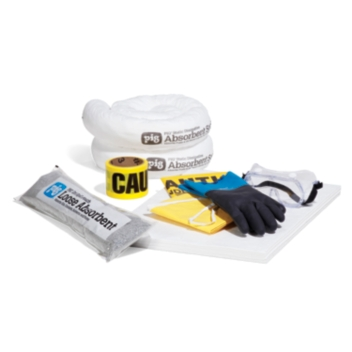
Refill for PIG® Fuel Station Spill Kit in Duffel Bag - RFL4003
Keep your PIG Fuel Station Spill Kit in Duffel Bag refilled so you're always ready for quick response to a fuel spill.
- Absorbs up to 13.6 L
- Ideal for KIT4003 and KIT4004
Includes:
- 2 - PIG® Static-Dissipative Absorbent Sock (SKM700)
- 15 - PIG® Stat-Mat® Absorbent Pad (MAT215)
- 1 - PIG® Dri Loose Absorbent in Spill Pouch (PLP220)
- 1 - Economy Goggle (GLS290-AF)
- 1 - SHOWA 3415 Neoprene Gloves (GLV1208-XL)
- 1 - Apron
- 5 - Polyethylene Disposal Bags (BAG201-S)
- 1 - Caution Tape
Description
- Packed with absorbent, static-dissipative mats and socks that pass NFPA99 standards for static decay and surface resistivity
- Also contains PIG Loose Absorbent, PPE, caution tape and cleanup tools
- Absorbs and retains fuels and oil-based fluids without taking in a drop of water
Specifications
| Fluid Absorbed: | Oils, Fuels, Other Oil-Based Liquids Only |
| Absorbency: | Up to 13.6 L |
| Sold as: | 1 each |
| Weight: | 4.2 kg |
| # per Pallet: | 30 |
| Composition: |
Mats and Socks - Polypropylene Loose Absorbent-100% Post-Consumer Recycled Cellulose |
| Includes: |
2 - PIG® Static-Dissipative Absorbent Sock (SKM700) 15 - PIG® Stat-Mat® Absorbent Pad (MAT215) 1 - PIG® Dri Loose Absorbent in Spill Pouch (PLP220) 1 - Economy Goggle (GLS290-AF) 1 - SHOWA 3415 Neoprene Gloves (GLV1208-XL) 1 - Apron 5 - Polyethylene Disposal Bags (BAG201-S) 1 - Caution Tape 1 - Instructions |
Additional Information
Product Data Sheet (PDS)
Safety Data Sheet (SDS) for PIG® Oil-Only Absorbents
Safety Data Sheet (SDS) for PIG® DRI Loose Absorbents
Chemical Compatibility Guide for PIG Spill Kits
Instructions for PIG Spill Kits
Dock Workers Rules (Safety, Health and Welfare), 1990, 78 (1)
Where there is a risk of explosion from electrical equipment....non-sparking tools shall be provided and used in such atmospheres.
National Oil Spill Disaster Contingency Plan (NOS-DCP) 8.3.2
Typical techniques involve: Application of sorbents either loose, as mats or in “sausages”. As many low viscosity chemical spills rapidly spread to cover a large surface area, these techniques are most applicable if the spread of the chemical can be confined.

